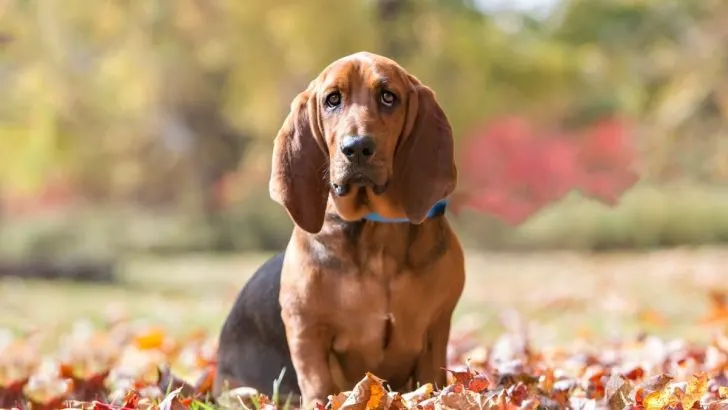Welcome aboard, fellow dog lovers! Today, I want to let you in on some secrets within Basset Hound’s growth stages…With some extra care tips. Sounds good? Well then, follow along!
With their distinctive droopy ears and soulful eyes, short legs and velvety ears, Basset Hound puppies are one of the most endearing breeds that are loved by everyone!
Let’s check out their growth stages!
Basset Hound Weight Chart
According to the official AKC breed standards, Basset Hounds are heavy-boned dogs with a solid and substantial build.
Despite their short stature, they are sturdy and muscular, giving them a powerful and compact look.
| Age (Months) | Male Weight (lbs) | Female Weight (lbs) |
| 2 | 8 – 12 | 7 – 10 |
| 4 | 16 – 20 | 14 – 18 |
| 6 | 24 – 28 | 22 – 26 |
| 12 | 40 – 50 | 35 – 45 |
| 18 | 45 – 65 | 40 – 55 |
Of course, these weight ranges are approximate and can vary between each Basset Hound puppy.
No two dogs are the same!
Basset Hound Growth Stages
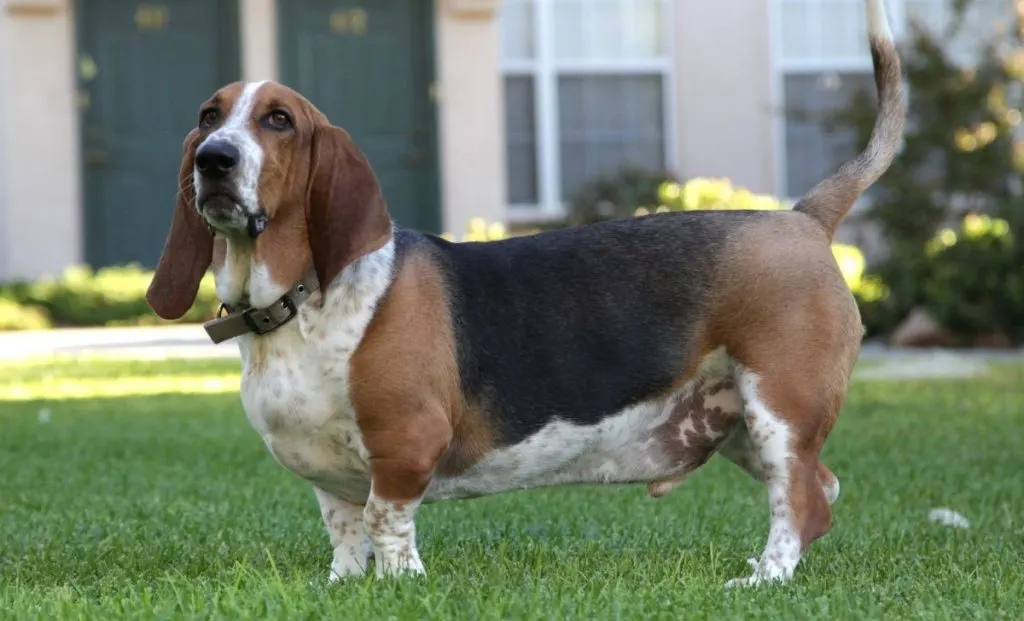
Watching your Basset Hound puppy is an experience that can’t be put into words. But, we will try to do it through these pawesome life stages.
Ready to see how your scent hound puppy will grow into a loyal hound? Read on!
Birth To 2 Weeks
What an exciting time! Basset Hound puppies are born, and they are the cutest little scent hounds out there!
During this fragile period, they are incredibly tiny and dependent on their mother since their eyes and ears are completely closed.
Therefore, they rely solely on touch and smell to figure out the living environment around them.
They are bonding with their mom, sleeping, and dreaming about all the things they will do when they grow up.
Yep, their main concern is snuggling, eating, and sleeping.
2 To 4 Weeks
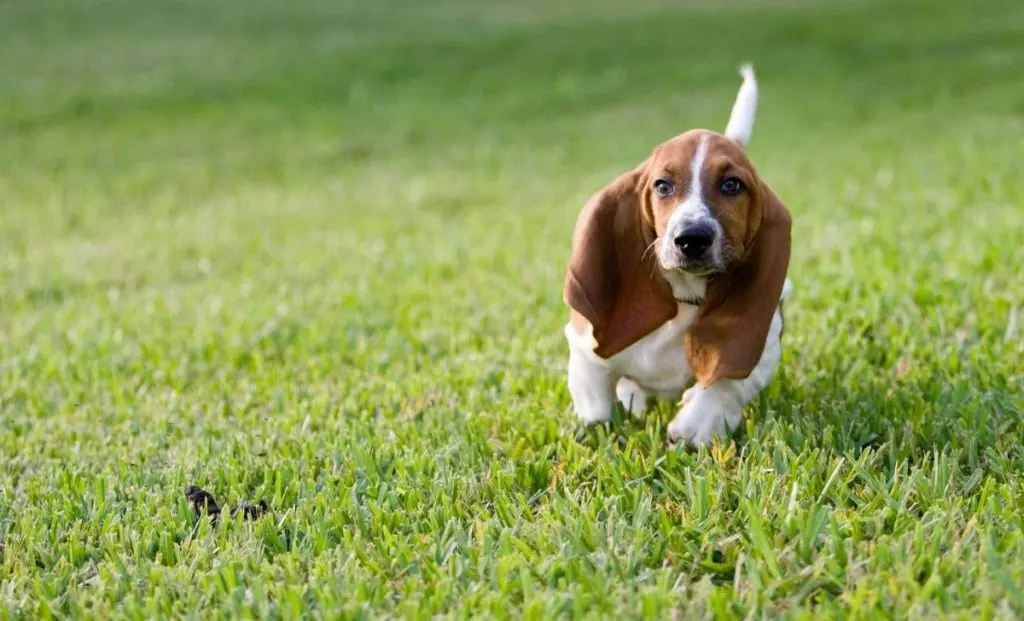
Basset Hound puppies start to discover the world around them in a big way! Their eyes and ears open up, so they can see and hear for the first time.
This is also a fun time because these little pack dogs start to play with their brothers and sisters. They learn how to interact with each other, which is great for their social skills.
They begin to show off those adorable droopy ears and their cute short legs. It’s important to keep an eye on their weight to make sure they are healthy and happy.
Feeding time is super important!
The puppies might start trying some soft, yummy puppy food along with their mom’s milk. This ideal diet helps them grow strong and help them gain healthy weight.
4 To 12 Weeks
During this life stage, Basset Hound puppies really start to show their playful side! This is a key period in the Basset Hound growth stages, marked by rapid development and learning.
By the end of this stage, our adorable puppies usually weigh between 8 to 12 pounds, which is a healthy weight for them. You can use a Basset Hound weight chart to make sure they are growing just right.
It’s important to feed them a proper diet formulated for puppies that is full of good stuff like protein, fats, and vitamins to help them grow strong and healthy.
We have to be careful not to give them too much food because they need to stay fit and not gain too much weight and become chubby!
Avoid human foods like chocolate, artificial sweeteners, fruit pits, macadamia nuts, table scraps, and other not-dog-friendly foods.
Training is super important during this time too. Basset Hound puppies are like little sponges. They soak up everything!
This is also the perfect time to start making friends!
The best way to do this is to let your puppy meet new people, gentle dogs, and other animals.
Positive experiences now will help them become happy and well-behaved loyal hounds later.
3 To 6 Months
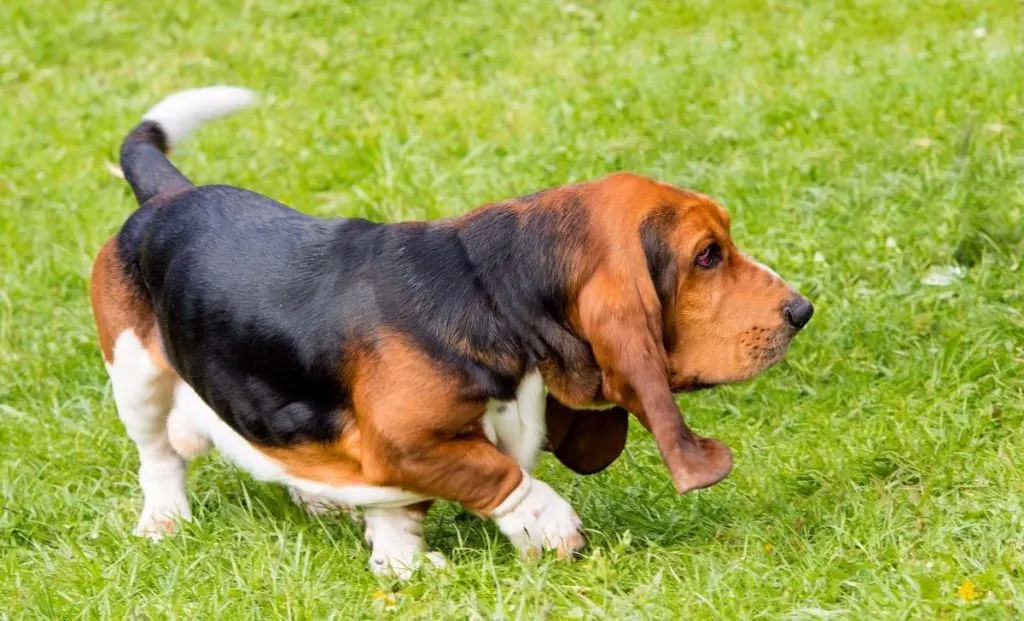
During the 3 to 6-month stage, Basset Hound puppies start to grow up fast! They go through a big growth spurt and become even more playful and curious.
By now, your Basset puppy will weigh between 20 to 35 pounds, standing at around 12 to 15 inches tall. It’s super important to keep track of their healthy weight using a Basset Hound weight chart.
Pet owners should continue with socialization and training.
Apart from that, make sure to keep them active. After all, Basset Hounds are scent hounds, so they love using their noses to explore.
Health monitoring is another important step during this stage.
Because Basset Hounds have short legs and a unique body structure, it’s very important to manage their weight gain carefully.
Moreover, their velvety ears and large ears need regular cleaning to prevent infections.
Remember, preventive care is your priority in order to catch diseases in this dog breed early on.
6 To 12 Months
As your Basset Hound puppy moves into the 6 to 12-month stage, they start transitioning from playful puppies into young adults.
During this time, you’ll notice some differences between male and female Basset Hounds.
Male Basset Hounds tend to grow larger and heavier, with a normal weight typically between 24 to 30 pounds, while female Basset Hounds weigh slightly less, around 20 to 28 pounds.
Your little scent dog will continue to grow and fill out their adult body mass.
These young dogs may look a bit awkward at times as their legs and bodies (and velvety ears!) grow at different rates.
Give them plenty of exercise to help them maintain a healthy weight and develop strong muscles.
However, it’s important not to overdo it, especially since Basset Hounds have short legs and a unique body structure (they tend to be short but heavy dogs).
Gentle play and short walks are usually enough to keep them active and healthy, all while not putting too much pressure on their legs.
At What Age Is A Basset Hound Full-Grown?
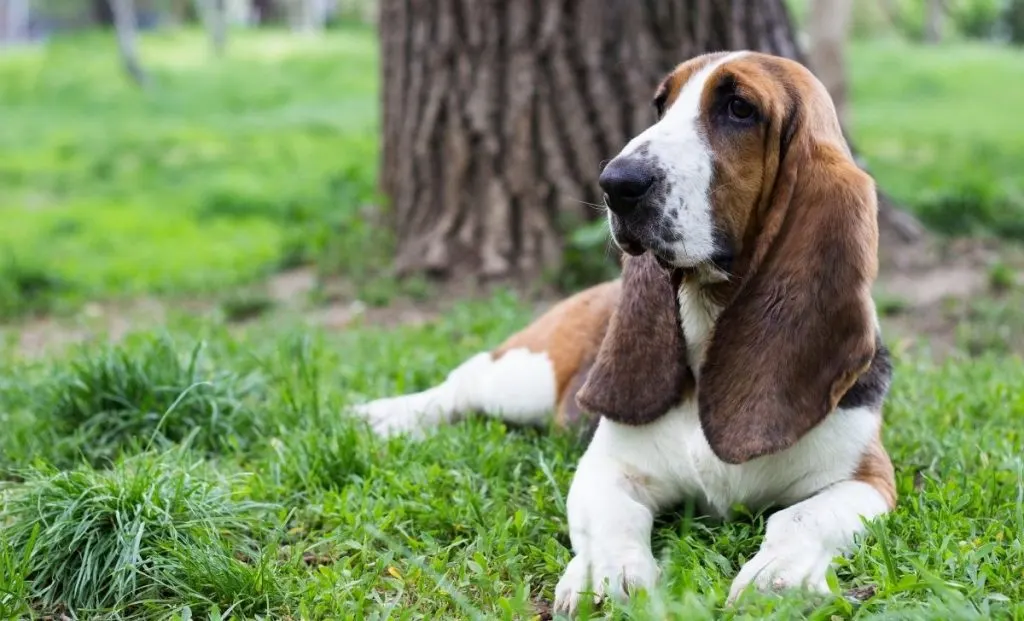
These loyal hounds typically reach their full-grown size by the time they are 18 months old.
In their first year of life, Basset Hounds grow the fastest. However, until they are 18 months old, they keep filling out and gaining muscle mass.
The biggest indicator of their full size is their weight and height. Surprisingly, Basset Hounds are considered heavy dogs relative to their height.
Despite their short stature, typically ranging from 13 to 15 inches at the withers, Basset Hounds are quite hefty. How hefty, you ask?
Well, by this age, males generally weigh between 45 to 65 pounds, and females between 40 to 55 pounds.
At What Age Do Basset Hounds Calm Down?
Even though they are known for their laid-back and easygoing nature, like all puppies, these little scent hounds can be quite energetic during their early years.
Basset Hounds typically reach full maturity by 18 months.
As they mature, these little guys tend to stabilize their energy levels, becoming less hyperactive.
This means that by around 1.5 to 2 years, you can expect your Basset Hound to start calming down naturally.
Basset Hound General Health Information
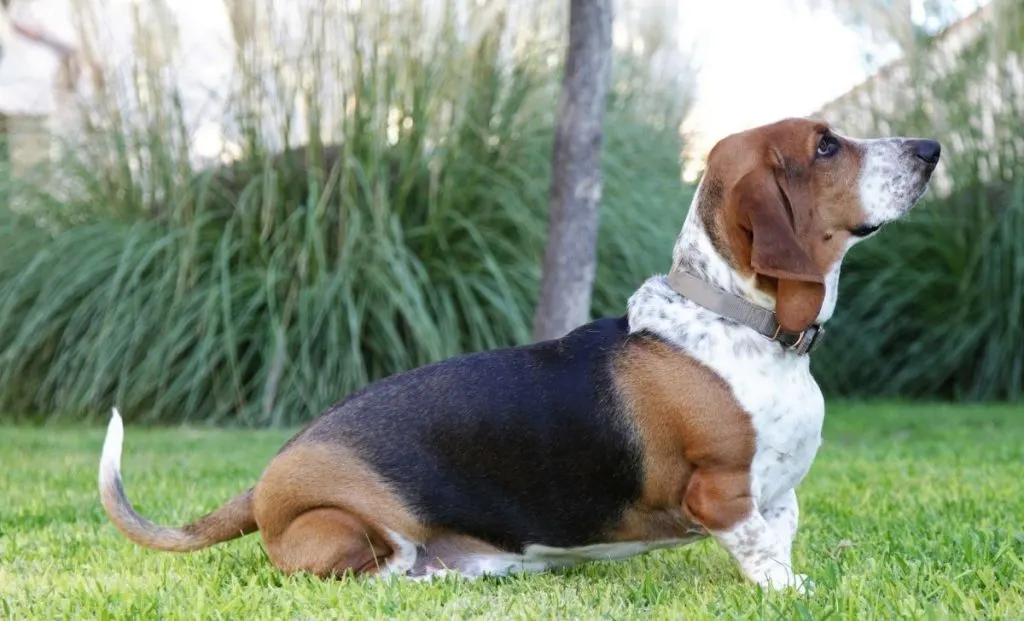
Purebred dogs like Basset Hounds can have certain health issues, so understanding the general health problems within this breed helps pet owners make sure their pups stay happy and healthy.
As a vet, I believe that it’s always good to stay informed about your furry friend’s health.
So, here are some health facts about this breed that are good to keep in mind.
Hip And Elbow Dysplasia
Basset Hounds are prone to certain health issues, such as hip and elbow dysplasia. These conditions occur when the joints don’t fit together properly, causing pain and mobility issues.
Regular vet check-ups and maintaining a healthy weight can help manage these conditions.
These issues are usually monitored through radiography, CT scans, and arthroscopy. If it occurs, early surgical interventions may help manage this condition (1).
Obesity
Being short and heavy dogs, Basset Hounds are prone to gaining additional weight throughout their life.
As you may have guessed, obesity is a common problem for these scent dogs due to their short legs and long bodies.
Too much weight can lead to painful conditions like hip dysplasia and elbow dysplasia.
Skin Problems
Basset Hounds’ adorable skin folds can lead to dermatitis and other skin issues.
In fact, these dogs are prone to Malassezia dermatitis, a skin condition caused by the yeast Malassezia pachydermatis.
This condition is more common in Basset Hounds with seborrhea, which is a skin disorder causing flaky, scaly skin (2).
Many other breeds like American Bullies and Bulldogs are prone to such skin problems due to various factors like genetics, environmental conditions, and allergies.
Keeping their skin clean and dry and regular grooming can prevent many skin problems.
Heart Disease
Basset Hounds are at risk for specific heart diseases, including tricuspid valve dysplasia, aortopulmonary fistula, and aortic thromboembolism.
They are prone to Congestive Heart Failure (CHF), which is a result of advanced heart disease where the heart can no longer pump blood effectively, leading to fluid buildup in the lungs and other body parts.
While heart disease can be a serious concern for Basset Hounds, it is important to keep in mind that early detection and prevention can improve their quality of life.
What Is The Life Expectancy Of A Basset Hound?
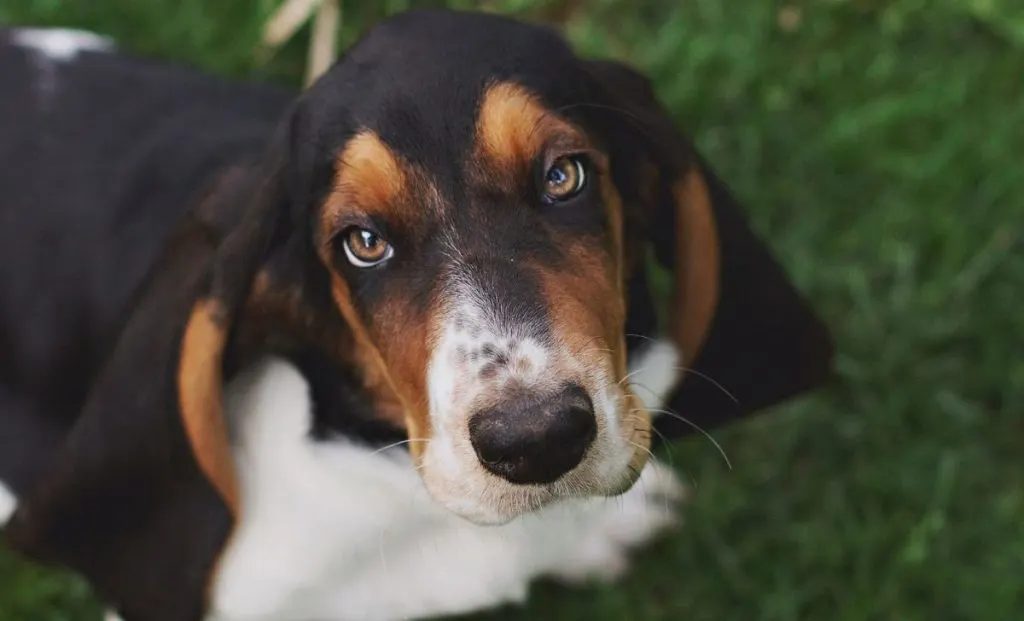
On average, the average lifespan of a Basset Hound is between 10 to 12 years, although some can live longer, reaching up to 13 or 14 years.
As you see, understanding the Basset Hound growth stages is important to make sure that your pup leads a long, healthy, and happy life. Each life stage requires specific care.
As a pet owner, ensuring your Basset Hound maintains a healthy weight through a balanced diet and regular exercise is your main concern!
Preventive veterinary care, including regular check-ups, gives you peace of mind. These visits help detect and manage medical conditions or any underlying problems early on.
So, enjoy every moment with your furry pal, and provide the best care through all the Basset Hound growth stages!
References
- Kapatkin, A., Volk, S., Keith, D., McLear, R., & Smith, G. (2003). Elbow dysplasia in a Basset Hound. Veterinary and Comparative Orthopaedics and Traumatology, 16, 11 – 15. https://doi.org/10.1055/s-0038-1632748.
- Bond, R., & Lloyd, D. (1997). Skin and mucosal populations of Malassezia pachydermatis in healthy and seborrhoeic Basset Hounds.. Veterinary dermatology, 8 2, 101-106 . https://doi.org/10.1046/J.1365-3164.1997.D01-4.X.

Meet Iram, a devoted veterinarian, passionate dog lover, and current Ph.D. candidate at Utrecht University in the Netherlands. Seamlessly blending her roles as a vet and content writer, Iram channels her love for dogs into heartfelt narratives.
Since childhood, Iram nurtured a dream of becoming a vet, a passion that runs deep in her family. Having now fulfilled that dream, she’s eager to share her acquired knowledge. In her writing, Iram not only explores the emotional bond between humans and their canine friends but also integrates her veterinary expertise, offering readers a holistic understanding of their beloved pets.
